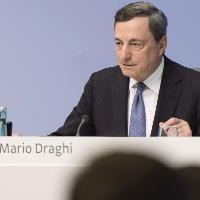(FRANKFURT) – The European Central Bank kept interest rates unchanged Thursday, with ECB president Mario Draghi suggesting financial markets had weathered a spike of uncertainty and volatility following the UK’s Brexit referendum.
The decision by the ECB’s governing council means that the interest rate on the main refinancing operations and the interest rates on the marginal lending facility and the deposit facility will remain unchanged at 0.00%, 0.25% and -0.40% respectively.
The council said it expects the key ECB interest rates to remain at present or lower levels for an extended period of time, and well past the horizon of the net asset purchases.
Regarding non-standard monetary policy measures, the ECB’s governing council confirmed that the monthly asset purchases of EUR 80 billion are intended to run until the end of March 2017, or beyond, if necessary, and in any case until it sees a sustained adjustment in the path of inflation consistent with its inflation aim.
On the UK referendum, the ECB president said “the announced readiness of central banks to provide liquidity, if needed, and our accommodative monetary policy measures, as well as a robust regulatory and supervisory framework, have all helped to keep market stress contained”.
“Financing conditions remain highly supportive”, he added, “which contributes to a strengthening in credit creation. They continue to support our baseline scenario of an ongoing economic recovery and an increase in inflation rates.”
The economic data showed that eurozone real GDP increased by 0.6%, quarter on quarter, in the first quarter of 2016, after 0.4% in the last quarter of 2015. Growth continues to be supported by domestic demand, while export growth has remained modest.
Looking ahead, the ECN continues to expect the economic recovery to proceed “at a moderate pace”. It says domestic demand remains supported by the pass-through of our monetary policy measures to the real economy. Favourable financing conditions and improvements in corporate profitability continue to promote a recovery in investment. Sustained employment gains, which are also benefiting from past structural reforms, and still relatively low oil prices provide additional support for households’ real disposable income and thus for private consumption. In addition, the fiscal stance in the euro area is expected to be mildly expansionary in 2016 and to turn broadly neutral in 2017 and 2018.
“At the same time”, said Mr Draghi, “headwinds to the economic recovery in the euro area include the outcome of the UK referendum and other geopolitical uncertainties, subdued growth prospects in emerging markets, the necessary balance sheet adjustments in a number of sectors and a sluggish pace of implementation of structural reforms. Against this background, the risks to the euro area growth outlook remain tilted to the downside.”



